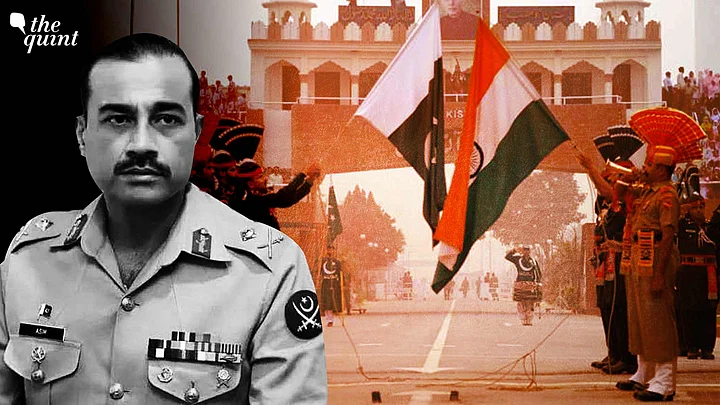This is the second part of the article on new Pakistan Army chief Asim Munir and what his appointment means for India. Read the first part of the article here.
Despite apprehensions over the new Pakistan Army chief Asim Munir’s past stint as the head of the Inter-Services Intelligence (ISI) and his apparent role in the Pulwama attack, his policies regarding India are unlikely to be different than what they were under previous generals, experts say.
Analysts argue that Pakistan's domestic issues, including its politics and economy, will keep the new army chief engaged, and away from focusing on India.
Munir's ISI Stint: AConcern
The India-Pakistan relationship hit one of its lowest points on February 2019 after a bombing carried out by Jaish-e-Mohammed (JeM) killed 44 CRPF personnel in Jammu and Kashmir's Pulwama. As ISI chief, Asim Munir was in the thick of things.
Now that Munir is the army chief, presumably the most powerful man in Pakistan, his every statement and every decision will have even a greater impact on the India-Pakistan relationship. His background as the ISI chief is certainly a concern, but it is unlikely to have a major consequence on his role as the army chief.
"His ISI stint and Pulwama happening at that time does cause apprehension in a manner that he may be more proactive on the terrorist front, but it is the same with all generals," says Major General (Retd.) Shashi Asthana, a New Delhi-based Global Strategic and Defence Analyst. "By and large they are all the same."
‘More Pressing Issues Than India’
Munir's predecessor, Bajwa, often advocated for normalising relations with India and spent his energy stabilising politics back home. Michael Kugelman, the Director of the South Asia Institute at the Wilson Center in Washington DC, argues that Bajwa's doctrine of managing tensions with neighbours, including India, will continue under Munir.
"Bajwa had put out this idea of positioning Pakistan as a locus for geoeconomics, he wanted Pakistan to strengthen ties, particularly commercial ties, with other countries including, potentially, India. I don't see why Munir would oppose that because the idea is to keep tensions down with neighbours in order to focus on promoting more stability at home."Michael Kugelman to The Quint
India is not going to be a priority issue for the new chief, as he is going to be focused on domestic issues, Kugelman adds.
Ajay Darshan Behera, a long-time watcher of Pakistan, and a professor at the Academy of International Studies, Jamia Millia Islamia, is of the view that the military leadership in Pakistan have more pressing concerns than India right now.
"Even if you assume Munir is not pro-India, he can be anti-India and he can think 'how I can keep India on its toes' but then he will also realise it is not the right time to put pressure on both the military and political leadership."Ajay Darshan Behera to The Quint
Behera says among the challenges before the new army chief, India is the least on the priority list.
"Right now, Pakistan is so internally focused. One important issue for the government and for the people is the economy. The military is also internally focused. Pakistan's military is not planning for war or defence of the country. They are bothered about who is going to come to power. They will be pretty tied up for at least one year until the elections. They will have no time for anything else."Ajay Darshan Behera to The Quint
“I don't think India-Pakistan is going to be an important issue for some time. They have more pressing concerns than India right now," he adds.
'No Change in Pak Army's Kashmir Policy'
Under Munir, the Pakistani army's stance vis-à-vis Kashmir is unlikely to go through any major change. Kugelman contends that regardless of who heads the Pakistani Army, the Kashmir issue will remain a constant in the country's discourse with India.
"…it didn't matter who the next army chief was going to be. Kashmir issue was going to continue to be a priority issue for the army. The leadership transition will not impact that calculus."Michael Kugelman to The Quint
"Whether it is General Bajwa or any other chief, the importance of the Pakistani military is on an anti-India stand. So, they have to continue playing the anti-India card, no matter who the army chief is," Lt General Satish Dua (Retd.) told The Quint in a previous conversation before Munir was appointed.
Asthana says the Pakistan Army, as an institution, will continue to behave in the manner in which they have been behaving and the appointment of Munir is unlikely to change anything.
The strictly followed February 2021 LoC ceasefire – a renewal of the 2003 agreement – is unlikely to be impacted, analysts say.
Asthana tells The Quint the ceasefire agreement will continue because Munir's domestic compulsions do not give him the leverage to violate the ceasefire agreement and start a new front. "In all probabilities, he should not be disturbing it, but we will have to wait and see."
Whatever his personal belief, Munir will not be able to alter the Pakistan Army's core policies, analysts say.
"He is part of an institution. The institution is a collective thing. He is the most powerful person in Pakistan, but he will not be able to do anything unless his core commanders are with him."Ajay Darshan Behera to The Quint
